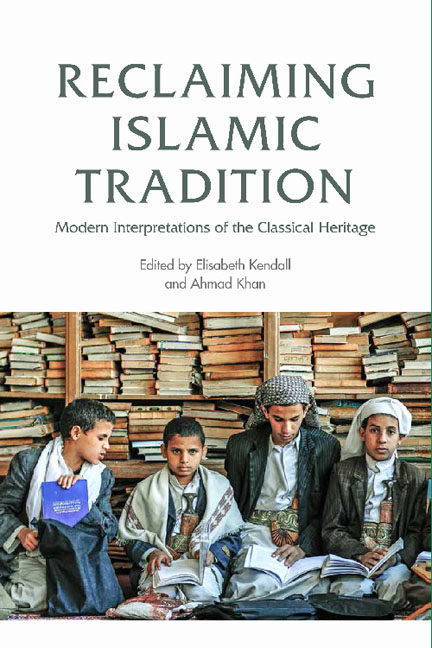Book contents
- Frontmatter
- Contents
- Acknowledgements
- About the Contributors
- Introduction
- 1 Modern Shiʿite Legal Theory and the Classical Tradition
- 2 Muḥammad Nāṣīr al-Dīn al-Albānī and Traditional Hadith Criticism
- 3 Islamic Tradition in an Age of Print: Editing, Printing and Publishing the Classical Heritage
- 4 Reaching into the Obscure Past: The Islamic Legal Heritage and Reform in the Modern Period
- 5 Reading Sūrat al-Anʿām with Muḥammad Rashīd Riḍā and Sayyid Quṣb
- 6 Contemporary Iranian Interpretations of the Qurʾan and Tradition on Women’s Testimony
- 7 Ibn Taymiyya Between Moderation and Radicalism
- 8 The Impact of a Sixteenth-Century Jihad Treatise on Colonial and Modern India
- 9 Jihadist Propaganda and its Exploitation of the Arab Poetic Tradition
- 10 Contemporary Salafi Literature on Paradise and Hell: The Case of ʿUmar Sulaymān al-Ashqar
- Index
5 - Reading Sūrat al-Anʿām with Muḥammad Rashīd Riḍā and Sayyid Quṣb
Published online by Cambridge University Press: 11 November 2020
- Frontmatter
- Contents
- Acknowledgements
- About the Contributors
- Introduction
- 1 Modern Shiʿite Legal Theory and the Classical Tradition
- 2 Muḥammad Nāṣīr al-Dīn al-Albānī and Traditional Hadith Criticism
- 3 Islamic Tradition in an Age of Print: Editing, Printing and Publishing the Classical Heritage
- 4 Reaching into the Obscure Past: The Islamic Legal Heritage and Reform in the Modern Period
- 5 Reading Sūrat al-Anʿām with Muḥammad Rashīd Riḍā and Sayyid Quṣb
- 6 Contemporary Iranian Interpretations of the Qurʾan and Tradition on Women’s Testimony
- 7 Ibn Taymiyya Between Moderation and Radicalism
- 8 The Impact of a Sixteenth-Century Jihad Treatise on Colonial and Modern India
- 9 Jihadist Propaganda and its Exploitation of the Arab Poetic Tradition
- 10 Contemporary Salafi Literature on Paradise and Hell: The Case of ʿUmar Sulaymān al-Ashqar
- Index
Summary
Introduction
One of the central themes pervading modern Qurʾanic exegesis (tafsīr) is a marked emphasis on the literary and thematic coherence of Qurʾanic suras or even of the entire Qurʾanic corpus. As Mustansir Mir has pointed out, exegetes from different regions of the Islamic world such as Ḥamīd al-Dīn al-Farāḥī (d. 1930) and Amīn Aḥsan Iṣlāḥī (d. 1997) in the Indian subcontinent, the Iranian scholar Muḥammad Ḥusayn al-Ṭabāṭabāʾī (d. 1981) or the Egyptian Sayyid Quṭb (executed in 1966) all concur that Qurʾanic suras are structured around thematic ‘pivots’ (sg. miḥwār), ‘hubs’ (sg. ʿamūd) or ‘aims’ (sg. gharaḍ), and at least to some extent these exegetes interpret the Qurʾan accordingly. Holistic leanings are also discernible in what is widely considered to be the inaugural work of modern Qurʾanic exegesis in Arabic, the Tafsīr al-Manār, published by Muḥammad Rashīd Riḍā (d. 1935) on the basis of lectures by Muḥammad ʿAbduh (d. 1905).
At first sight, such tendencies form a noticeable contrast with pre-modern tafsīr works, which often limit their attention to single verses or brief verse groups. Nevertheless, some consideration of aspects of textual coherence is by no means absent from the earlier exegetical tradition. For instance, already the Qurʾanic commentary of Fakhr al-Dīn al-Rāzī (d. 1210) explores the linear connections or interrelationships (sg. munāsaba) between adjoining verses, and some 250 years later the Mamluk exegete al-Biqāʿī (d. 1480) programmatically declared that understanding such interrelationships required the discovery of the ‘aim (gharaḍ) at which a particular sura is directed’ and to which all of its components are subordinate. To some degree, then, the uptake of such holistic and coherentist precedents by modern exegetes resembles the career of concepts like ijtihād or maṣlaḥah, which are likewise traditional notions that are accorded new prominence and are significantly re-cast from the late nineteenth century onwards.
It has been pointed out that the ‘progression from an atomistic to an organic approach runs parallel in literature and in tafsīr, with a slightly delayed reaction in the latter’. In part, the increased attention of twentieth-century exegetes to the Qurʾan's coherence is therefore due to literary and aesthetic factors.
- Type
- Chapter
- Information
- Reclaiming Islamic TraditionModern Interpretations of the Classical Heritage, pp. 136 - 159Publisher: Edinburgh University PressPrint publication year: 2018



